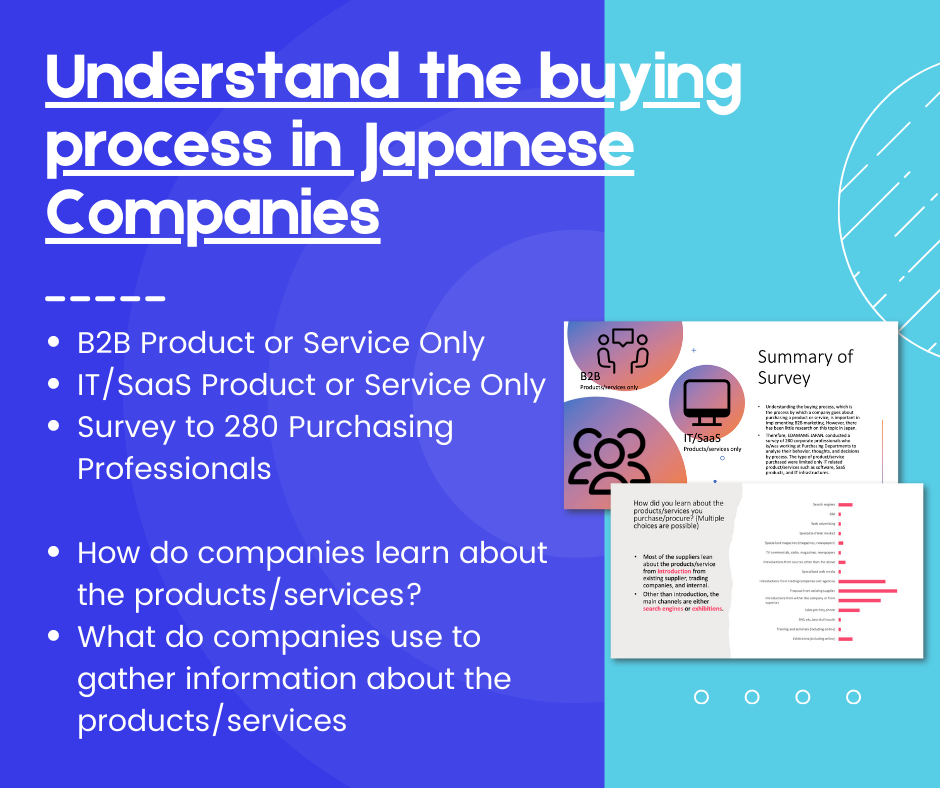Enterprise Focus: Navigating B2B Marketing in Japan

In the dynamic world of B2B marketing, Japan presents a landscape rich with unique challenges and opportunities, especially when it comes to engaging with enterprise-level clients. Navigating this terrain requires a deep understanding of the distinct approaches that resonate within the Japanese business culture.
For international marketers, Japan’s enterprise sector is not just another market segment; it’s a realm where traditional Western marketing tactics often need significant adaptation. The nuances of Japanese business etiquette, decision-making processes, and communication styles demand a tailored strategy. This is particularly true in the realm of enterprise marketing, where the stakes are high and the expectations are even higher.
Understanding these subtleties is crucial. In Japan, enterprise clients value long-term relationships, meticulous attention to detail, and deep respect for hierarchical and group dynamics. The approach here is less about the hard sell and more about building trust, understanding the client’s needs, and demonstrating unwavering commitment to quality and service.
As we delve into the world of B2B marketing for Japanese enterprises, we’ll explore the key strategies to help international marketers enter this market and thrive in it. From the intricacies of lead generation to the art of relationship-building, this guide aims to equip you with the insights needed to make a significant impact in one of the world’s most sophisticated and challenging business environments.
Understanding the Japanese Enterprise Market
The Japanese enterprise market is distinct in its approach and expectations, especially regarding decision-making and relationship-building. Key decision-makers in these organizations often exhibit a conservative and risk-averse approach, valuing long-term stability, employee welfare, and the company’s reputation. This results in a methodical and consensus-driven decision-making process, which is quite different from the more individualistic and rapid decision-making often seen in Western enterprises.
Lead generation in this market also differs significantly from strategies used for Small and Medium Businesses (SMBs). While SMBs might be receptive to direct marketing tactics and digital campaigns, enterprise leads in Japan are more effectively cultivated through nuanced and indirect channels. Personal introductions, networking at industry events, and establishing thought leadership are crucial. The aggressive marketing strategies that might succeed in other markets can be less effective or even counterproductive here.
Cultural nuances are central to shaping effective marketing strategies for Japanese enterprises. The concept of ‘Omotenashi‘, emphasizing deep hospitality and service, is deeply embedded in Japanese business culture. Marketing efforts must therefore be respectful, highly personalized, and demonstrate a clear understanding of the client’s specific needs and challenges. Additionally, ‘Nemawashi‘, the process of laying the groundwork for proposed changes or projects, is a critical concept in Japanese business dealings. Effective marketing in this context involves careful planning and a patient approach to building relationships and achieving results.
Lead Generation Strategies for Japanese Enterprises
In Japan, traditional lead generation tactics such as online advertisements or whitepaper downloads often fall short when targeting key enterprise persons. While effective in other markets, these methods may not resonate with the more discerning and specific needs of Japanese enterprise decision-makers. Instead, a more customized and relationship-focused approach is required.
The critical role of skilled sales personnel cannot be overstated in the ‘last one mile’ of enterprise sales. In the Japanese market, the final stages of securing a business deal rely heavily on personal interactions and the ability to navigate complex corporate hierarchies. Sales professionals must be adept at presenting their products or services and excel in understanding and respecting the subtle nuances of Japanese business culture. This includes recognizing the importance of formalities, honorifics, and the indirect style of communication that is prevalent in Japanese business interactions.
Furthermore, an effective marketing strategy for Japanese enterprises must go beyond digital tactics. While online presence and digital marketing are essential, they should complement real events and roundtable discussions involving decision-makers. These face-to-face interactions provide a platform for deeper engagement and allow for a more thorough understanding of the client’s needs and concerns. In these settings, marketers can demonstrate their commitment to the client and build the trust essential for long-term business relationships.
Incorporating these strategies into your marketing plan can significantly enhance your ability to generate leads and close deals with Japanese enterprises. It’s about understanding that in this market, personal connections, respect for protocol, and a patient, thoughtful approach are key to success.
Decision-Making in Japanese Enterprises
The decision-making process in Japanese enterprises is markedly different from what many international marketers might be accustomed to. It is predominantly a bottom-up process, contrary to the top-down approach often observed in Western corporations. This means that decisions are not solely made at the executive level but involve a comprehensive review and consensus-building at various levels of the organization.
A critical aspect of this process is the role of individuals responsible for drafting approval documents, known as 稟議書 (ringi-sho). These documents are essential in Japanese corporate decision-making and are often prepared by mid-level managers, typically in their late 20s to 30s. Despite not being at the top of the corporate hierarchy, these individuals wield significant influence as they lay the groundwork for decisions and facilitate approval.
Engaging with these key influencers is crucial. Strategies to connect with them include:
1. Understanding Their Role and Influence: Recognize that these individuals are the gatekeepers to higher-level decision-makers. They deeply understand the company’s internal processes and are instrumental in moving proposals forward.
2. Tailoring Communication: When engaging with these managers, ensure that your communication is clear, concise, and aligned with the company’s goals and values. It’s important to provide them with comprehensive information that they can use to advocate for your product or service within the company.
3. Building Relationships: Establishing a rapport with these mid-level managers is key. This can be achieved through regular, respectful communication, genuine interest in understanding their challenges and offering solutions that align with their objectives.
4. Providing Exceptional Support: Offer support and resources that these managers can use to make a compelling case for your product or service. This includes detailed product information, case studies, and data demonstrating the value and benefits of your offering.
5. Patience and Persistence: The decision-making process in Japanese enterprises can be lengthy. It’s essential to be patient and maintain consistent, respectful follow-up. Building trust and credibility takes time, and rushing the process can be counterproductive.
By understanding and adapting to this unique decision-making process, international marketers can more effectively navigate the complexities of the Japanese enterprise market, ultimately leading to more successful business engagements.
Sales and Marketing Alignment in Enterprise Accounts
In the nuanced world of Japanese enterprise sales, the harmonious alignment of sales and marketing is a subtle yet powerful tool. This synergy is crucial for navigating the unique challenges of this market. Sales and marketing teams must collaborate, sharing objectives, insights, and strategies.
The key lies in blending the reach and educational power of digital marketing with the personalized touch of direct sales efforts. For instance, while digital marketing can pique interest and generate leads, the intricacies of closing deals often require the nuanced, relationship-focused approach of sales teams.
Successful campaigns in this market often showcase a mix of targeted digital content, like industry-specific articles and webinars, alongside personalized outreach efforts such as face-to-face meetings and tailored presentations. This approach raises awareness and builds the trust and understanding necessary for successful enterprise engagements.
Moreover, leveraging local insights and adapting strategies to the Japanese context is essential. This might mean localizing global marketing materials or creating Japan-specific case studies. A continuous feedback loop between sales and marketing ensures that strategies remain dynamic and responsive to the market’s pulse.
In essence, the fusion of sales and marketing in Japanese enterprise accounts is less about overt selling and more about creating a seamless, informed journey for the customer, from initial awareness to the final handshake.
Conclusion
As we have explored, successful B2B marketing in Japan’s enterprise sector requires a nuanced understanding of the market’s unique characteristics. The key strategies involve a deep appreciation for the conservative, consensus-driven decision-making process, a focus on relationship-building, and a patient, respectful approach to sales and marketing efforts.
The importance of cultural sensitivity in this context cannot be overstated. From recognizing the influence of mid-level managers in the decision-making process to the necessity of aligning sales and marketing strategies, each aspect of your approach should reflect a deep understanding of Japanese business culture. This includes adapting to the bottom-up decision-making process, leveraging personal connections, and ensuring that all marketing and sales activities are tailored to the specific needs and preferences of Japanese enterprises.
In summary, the path to success in Japan’s enterprise market lies in a strategic, culturally aware approach that respects the nuances of Japanese business practices and prioritizes long-term relationship-building over aggressive sales tactics.
—
The journey can be complex but rewarding for international companies looking to penetrate the Japanese enterprise market. If you’re seeking specialized B2B marketing solutions that are tailored to the unique demands of Japanese enterprises, our agency is here to guide you. We offer expertise and insights that can help you navigate this challenging landscape and build successful, enduring business relationships in Japan. Contact us to learn more about how we can help you achieve your business goals in this dynamic market.
About us and this blog
We are a digital marketing company with a focus on helping our customers achieve great results across several key areas.











